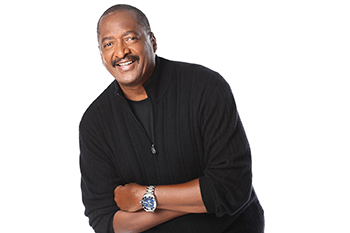Breast Cancer Survivor
Finding gratitude and courage through a cancer experience

Mathew Knowles is a male chest cancer survivor. The father of multi-talented superstars Beyoncé and Solange, he credits his positive outcome to early detection. His diagnosis at 67 years old changed his life, and he is committed to raising awareness about this diagnosis and the importance of genetic screening.
As a top sales rep for Xerox Medical Systems in the 1980s, I sold equipment that used cutting-edge technology called xero- radiography for breast cancer detection. Part of the training that helped me teach medical professionals how to use the technology included a brief section about male breast cancer. At the time, I had no idea that training would one day save my life.
Roughly 40 years later, I opened a pack of white T-shirts my wife Gena had bought for me. After wearing the first one, I noticed tiny red dots on it, but they didn’t faze me. The next day, after wearing the second one, I noticed them again. I thought perhaps it was ink from the packaging. On the third day, the same thing happened. I told Gena, and she said she’d seen little spots of blood on the sheets on my side of the bed. I remembered from my training that nipple discharge was a symptom of breast cancer, so I immediately called my doctor and told him I needed a mammogram. Never having had a male patient request a mammogram, he wasn’t convinced I needed one, but I insisted. The results were concerning, and a biopsy followed. Sure enough, it was cancer.
Fortunately, because it was caught early, it was Stage IA. A trusted friend and my referring physician connected me with an oncologist and a surgeon. Surgery followed by maintenance therapy was the recommendation. I felt comfortable with my medical team and the treatment plan, so, three days later, I had a radical mastectomy to remove tissue from my left breast. With the support of my family and my skilled medical team, my treatment was successful. But, that’s not the end of my story.
My surgeon decided to do genetic testing on the tissue removed during my surgery. The results showed I carried the BRCA2 mutation. I researched my family medical history and made a shocking discovery: I’d lost four uncles to prostate cancer and my grandma, great aunt, aunt and two female cousins to breast cancer.
Because the BRCA2 mutation can increase the risk of melanoma and prostate, pancreatic and breast cancers, my immediate family got tested. I was relieved to learn that my daughters, Beyoncé and Solange, don’t carry the mutation. If I’d known about it before making my treatment decisions, I would have chosen to have a radical mastectomy of both breasts.
I’m cancer-free for now, so I make routine screenings a priority. I have a mammogram as well as MRIs on my prostate and pancreas annually. I keep an eye on my PSA, and I see a dermatologist every two years for a skin check.
I’ve also made lifestyle changes that have improved my physical and mental health. I eat mainly fruits and vegetables, sometimes with chicken and fish, and I’ve lost more than 30 pounds. I’ve reduced my alcohol consumption. I exercise routinely, surrounded by beautiful mountains and the ocean, and I enjoy meditating while I walk.
Knowing the genetics of your family is so important. I’ve told everyone in my family about our medical history. As a public speaker focusing on health and wellness for men, and especially for black men, I emphasize how genetic testing can identify your risk for certain cancers, heart disease and other conditions. And it can be so easy to find out. Sometimes all that is required is a saliva test.
I’m also passionate about how our culture approaches male breast cancer. Personally, I prefer to call it “male chest cancer” because men generally don’t refer to our breasts. We call it our chest. I think we can relate better to that terminology.
Society also has a different mindset about chests versus breasts, and that influences how men with this diagnosis are treated. For example, women are given robes to cover up while they await their mammograms. I kindly refused the robe I was offered because it wasn’t necessary. I also answered politely when I was asked if I was waiting for my wife at my own appointment. Bottom line, when a man has to open a door marked “Women’s Breast Center” for his appointment, it’s embarrassing. Though unintentional, I think things like these contribute to men feeling ashamed about having what is traditionally deemed a “woman’s cancer.”
After my diagnosis, I recalled a chance encounter I had with a nun at LAX. I gave her a donation, and she gave me a card. It encouraged finding opportunity out of adversity. I struggled to see the opportunity in having cancer, but I realize I’ve been blessed to have a small platform that enables me to bring genetic screening and male chest cancer into the spotlight.
This experience changed my life. I’m so much closer to my family now. Gena and I laugh every night that we’re together, and I feel a different level of gratitude that I didn’t before. I hope that talking about these important topics gives people the courage to advocate for their own health.


